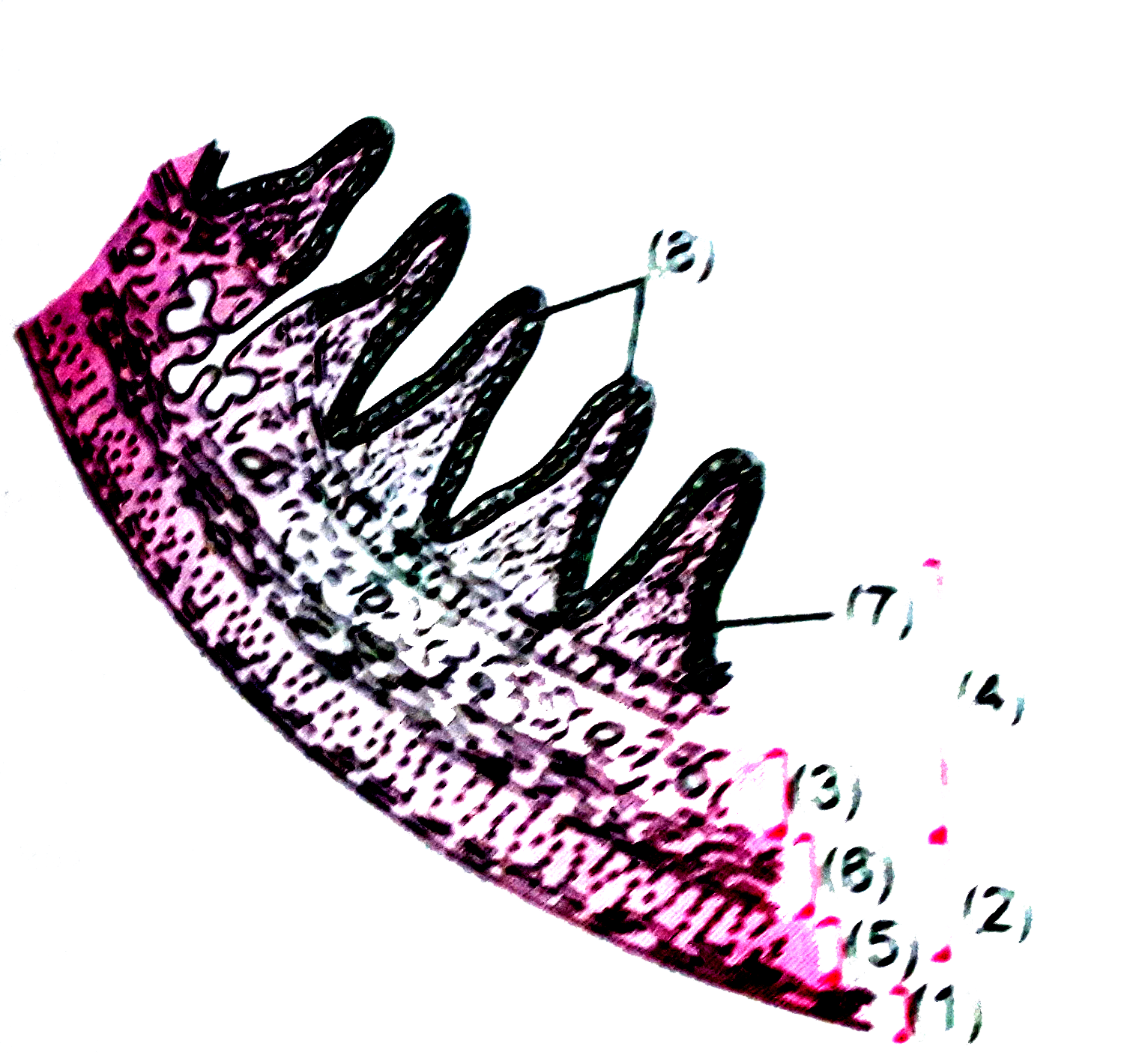Which part of alimentary canal of cockroach has an outer layer of thick circular muscles and inner cuticle forming six highly chitinous plates called teeth?
3
6
9
12
The correct Answer is:B
Step by step video & text solution for Which part of alimentary canal of cockroach has an outer layer of thick circular muscles and inner cuticle forming six highly chitinous plates called teeth? by Biology experts to help you in doubts & scoring excellent marks in Class 12 exams.
Similar Questions
Figure depicts microsopic structure of the intestinal wall of alimentary canal. Study the figure and answer the following question?
(i) The wall of alimentary canal consists of 4 main concentric coats labelled as 1,2,3 and 4. Name these coats.
(ii) The coat marked 2 has two layers marked as 5 and 6. Between these two layers is a network of nerve cells and para-sympathetic nerve fibres called..... It controls the .......
(iii) The coat marked 3 is highly vasucular connective tissue having another network of nerve cells and sympathetic nerve fibres called...... . it controls the secretion of ........
(iv) Name the parts labelled as 7 and 8
 View Solution
View SolutionAnatomically, the ear can be divided into three major sections called the outer ear, the middle ear and the inner ear. How many statements are correct for inner ear?
i. The organ of Corti is a structure located on the basilar membrane which contains hair cells that act as auditory receptors.
ii. A large number of processes called stereo cilia are projected from the apical part of each hair cells
iii. Above the rows of the hair cells is a thin elastic membrane called tectorial membrane
iv. The vestibular apparatus is composed of three semi-circular canals and the otolith organ consisting of the saccule and utricle.
v. Semi-circular canals contain a projecting ridge called macula
vi. The saccule and utricle contain a projecting ridge called cristae
vii. The cristae and macula responsible for maintenance of balance of the body and posture.View Solution
Knowledge Check
- Question 1 - Select One
Which part of alimentary canal of cockroach has an outer layer of thick circular muscles and inner cuticle forming six highly chitinous plates called teeth?
A3B6C9D12 - Question 2 - Select One
In which part of alimentary canal of cockroach is invagination of cuticle found ?
AAnterior partBIn midpartCIn posterior partDBoth in antherior and posterior part - Question 3 - Select One
Read the passage and answer the questions:
Implantation is the embedding of the blastocyst into the endometrium of the uterus. Blastocyst is a ball of cells with a large, fluid-filled cavity called the blastocoel. The blastomeres in the blastocyst are arranged into an outer layer called trophoblast and inner cell mass. With the formation of blastocoel, morula is converted to blastula which is called blastocyst in mammals.
The ectoderm cells will form the........ASkeletal systemBNervous systemCExcretory systemDRespiratory system
Read the passage and answer the questions:
Implantation is the embedding of the blastocyst into the endometrium of the uterus. Blastocyst is a ball of cells with a large, fluid-filled cavity called the blastocoel. The blastomeres in the blastocyst are arranged into an outer layer called trophoblast and inner cell mass. With the formation of blastocoel, morula is converted to blastula which is called blastocyst in mammals.
Assertion (A): Blastocyst undergoes gastrulation to form three germinal layers.
Reason (R): This involves cell movements (morphogenetic movement) that help to attain new shape and morphology of embryo.View SolutionRead the passage and answer the questions:
Implantation is the embedding of the blastocyst into the endometrium of the uterus. Blastocyst is a ball of cells with a large, fluid-filled cavity called the blastocoel. The blastomeres in the blastocyst are arranged into an outer layer called trophoblast and inner cell mass. With the formation of blastocoel, morula is converted to blastula which is called blastocyst in mammals.
Which organ is formed during gastrulation ?View SolutionArrange the following parts of alimentary canal in sequence from outerto inner
A. Mucosa B. Submucosa
C. Serosa
D. Longitudinal muscles
E.Circular musclesView SolutionAssertion:The placentation in which the placenta forms a ridge along the ventral suture of ovary and ovules are borne on this ridge forming two rows is called parietal placentation.
Reason:The marginal placentation has ovules developed on the inner wall of the ovary or on peripheral part.View SolutionThe human eye is a complex part of the body that is used for seeing. Eyes enable people to perform daily tasks and to learn about the world that surrounds them. Sight. or vision, is a rapidly occurring process that involves continuous interaction between the eye, the nervous system, and the brain. When someone looks at an object, what he really sees is the light reflected from the object. This reflected light passes through the lens and falls on the retina of the eye. Here the light induces nerve impulses that travel through the optic nerve to the brain and then over other nerves to muscles and glands.
The eye is similar to a television camera. Both the eye and the television camera convert light energy to electrical energy. The eye converts light to nerve impulses that are interpreted by the brain as the sense perception called sight. A television camera converts light to electronic signals that are broadcast and transformed into light images in a television receiver. It is wonderful that human eyes blink an average of once every six seconds. This washes the eye with the salty secretion from the tear or lachrymal glands. Each tear gland is about the size and shape of an almond. These glands are situated behind the upper eyelid at the outer corner of the eye. After passing over the eye, the liquid from the gland is drained into the nose through the tear duct at the inner corner of the eye.
What do we see when we look at an object?View Solution

